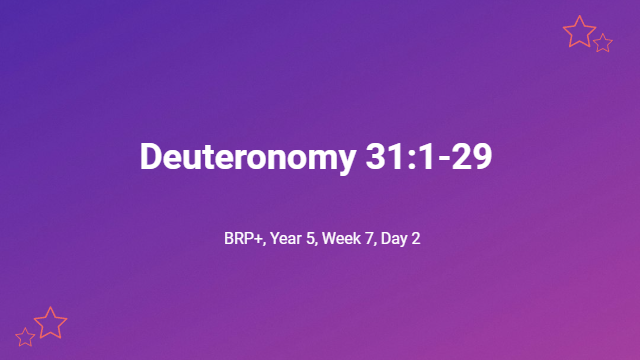Deuteronomy 31:1-29
Q.1. How could Israel expect to succeed after Moses had died? What plan did Moses put in place to ensure that the people did not forget God’s Law? – (Dt.31:1-13)
Moses did not claim the credit for Israel’s success under his leadership – It is the Lord your God who will cross ahead of you; He will destroy these nations before you, and you shall dispossess them … (Dt.31:3). Therefore, a change of human leadership could be just as successful, provided they all continued to obey Him – The Lord is the one who goes ahead of you; He will be with you. He will not fail you or forsake you. Do not fear or be dismayed.” (Dt.31:8). The same God Who defeated the mighty kings on their wilderness journeys would help then conquer their enemies in the Promised Land. Besides, God had sworn to give them the Promised Land. Since their success depended on keeping the Covenant, Moses commissioned the priests – 10 … “At the end of every seven years, at the time of the year of remission of debts, at the Feast of Booths, 11 when all Israel comes to appear before the Lord your God at the place which He will choose, you shall read this law in front of all Israel in their hearing (Dt.31:10-11). So in succeeding generations – 12 Assemble the people, the men and the women and children and the alien who is in your town, so that they may hear and learn and fear the Lord your God and be careful to observe all the words of this law. 13 Their children, who have not known, will hear and learn to fear the Lord your God, as long as you live on the land which you are about to cross the Jordan to possess.” (Dt.31:12-13). The Word of God should never be far from their minds.
Q.2. How did God appear to Moses and Joshua? Why did God instruct Moses to write and teach a song to Israel? What did the song prophesy about Israel’s future? – (Dt.31:14-22)
Joshua experienced the presence of God, as Moses had often experienced – The Lord appeared in the tent in a pillar of cloud, and the pillar of cloud stood at the doorway of the tent (Dt.31:15). God gave him a challenge to face, early in his leadership. God’s people would break their Covenant with God, thus incurring His wrath. (Dt.31:16-18). This prophetic warning was to be composed into a song – “Now therefore, write this song for yourselves, and teach it to the sons of Israel; put it on their lips, so that this song may be a witness for Me against the sons of Israel (Dt.31:19). God knew clearly what His people are capable of, and in grace wanted this song as an appeal to bring the nation back – Then it shall come about, when many evils and troubles have come upon them, that this song will testify before them as a witness (for it shall not be forgotten from the lips of their descendants); for I know their intent which they are developing today, before I have brought them into the land which I swore.” (Dt.31:21). Moses did as God asked.
Q.3. What was Joshua’s calling? What was to be done to the completed record of the book of the Law? Was Moses confident that God’s people would remain faithful to the covenant? – (Dt.31:23-29)
Joshua was to lead Israel into the Promised Land – Then He commissioned Joshua the son of Nun, and said, “Be strong and courageous, for you shall bring the sons of Israel into the land which I swore to them, and I will be with you.” (Dt.31:23). Moses finished writing the Book of the Law and gave it to the Levites for safe keeping – “Take this book of the law and place it beside the ark of the covenant of the Lord your God, that it may remain there as a witness against you (Dt.31:26). Moses then gathered all the elders and officers of the twelve tribes and taught the song that recorded the testimony to God’s faithfulness, and Israel’s stubbornness and rebellion.

